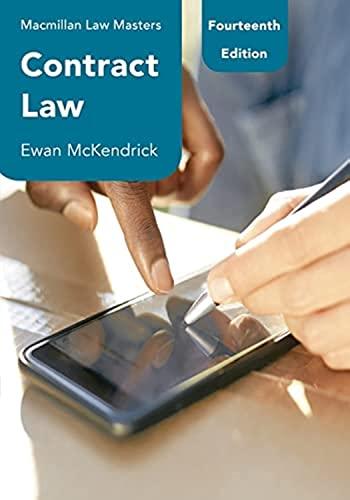Question
Chapter 10 Question # 4: Mirage Investments Corp. (MIC) planned a tender offer for the shares of Gulf States International Corp. (GSIC). Archer, an officer
Chapter 10
Question # 4:Mirage Investments Corp. (MIC) planned a tender offer for the shares of Gulf States International Corp. (GSIC). Archer, an officer of MIC, placed purchase orders for GSIC stock through the New York office of the Bahamian Bank (BB) prior to the announcement of the tender offer, making a $300,000 profit when the tender offer was made public. The Bahamas is a secrecy jurisdiction. The bank informed the SEC that under its law, it could not disclose the name of the person for whom it purchased the stock. What, if anything, may the SEC do to discover whether the federal securities laws have been violated?
Chapter 11
Question #9:Dozier and his wife, daughter, and grandson lived in the house Dozier owned. At the request of the daughter and grandson, Paschall made some improvements to the house. Dozier did not authorize these, but he knew that the improvements were being made and did not object to them. Paschall sued Dozier for the reasonable value of the improvements, but Dozier argued that he had not made any contract for such improvements. Was he obligated to pay for such improvements?
Chapter 11
Questions#12
Carriage Way was a real estate development of approximately 80 houses and 132 apartments. The property owners were members of the Carriage Way Property Owners Association. Each year, the associ- ation would take care of certain open neighboring areas, including a nearby lake, that were used by the property owners. The board of directors of the asso- ciation would make an assessment or charge against the property owners to cover the cost of this work. The property owners paid these assessments for a number of years and then refused to pay any more. In spite of this refusal, the association continued to take care of the areas in question. The association then sued the property owners and claimed that they were liable for the benefit that had been conferred on them. Were the owners liable? [Board of Directors of Carriage Way Property Owners Ass n v. Western National Bank, 487 N.E.2d 974 (Ill. App.)]
Chapter 11
Question#13, When improvements or buildings are added to real estate, the real estate tax assessment is usually increased to reflect the increased value of the prop- erty. Frank Partipilo and Elmer Hallman owned neighboring tracts of land. Hallman made improve- ments to his land, constructing a new building and driveway on the tract. The tax assessor made a mis- take about the location of the boundary line between Partipilo's and Hallman's land and thought the improvements were made on Partipilo's property. Instead of increasing the taxes on Hallman's land, the assessor wrongly increased the taxes on Partipilo's land. Partipilo paid the increased taxes for three years. When he learned why his taxes had been increased, he sued Hallman for the amount of the increase that Partipilo had been paying. Hallman raised the defense that he had not done anything wrong and that the mistake had been the fault of the tax assessor. Decide. [Partipilo v. Hallman, 510 N.E.2d 8 (Ill. App.)]
TEXT,
Twomey, David and Marianne Moody Jennings,Business Law: Principles for Today's Commercial Environment,West Legal Studies in Business, 2017, 5th edition.
Step by Step Solution
There are 3 Steps involved in it
Step: 1

Get Instant Access to Expert-Tailored Solutions
See step-by-step solutions with expert insights and AI powered tools for academic success
Step: 2

Step: 3

Ace Your Homework with AI
Get the answers you need in no time with our AI-driven, step-by-step assistance
Get Started


